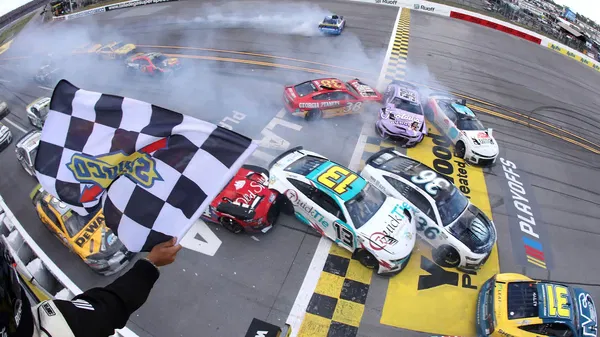NASCAR has unveiled a significant marketing overhaul for 2025, aiming to make its drivers the centerpiece of promotional efforts. This initiative, intended to attract new fans while keeping current ones engaged, has sparked widespread controversy on social media. Critics argue that the plan reflects NASCAR’s increasing control over its drivers, risking the sport’s authenticity.

The Plan in Detail
The centerpiece of the new strategy is a driver-focused incentive program designed to reward drivers for promoting the sport through a proprietary digital app. Payouts for participating drivers could range from tens of thousands to $1 million annually. NASCAR COO Steve O’Donnell is optimistic about the program, emphasizing its potential to elevate the drivers’ profiles and expand the sport’s audience. However, fans are questioning whether this aligns with NASCAR’s traditional roots.
.@NASCAR thinks that there’s been a lot — perhaps too many — different marketing messages in the industry recently, and getting the different stakeholders “all singing from the same hymn book is going to be a big goal for us in 2025,” per Steve O’Donnell. https://t.co/SCpd3dLC0i
— Adam Stern (@A_S12) December 14, 2024
This strategy arrives as NASCAR enters a new era marked by fresh media rights agreements and charter renewals in 2025. O’Donnell explained that NASCAR aims to unify its promotional approach, spotlighting drivers across all tiers of the sport, including the Cup Series, Xfinity Series, Craftsman Truck Series, and grassroots racing.
To execute this initiative, NASCAR plans to allocate a pool of money—estimated at $10–20 million annually—to incentivize drivers who participate in promotional activities. The app, developed in collaboration with INFLCR, a brand-building software company, will serve as a central hub. Through this app, drivers can find promotional opportunities, such as media appearances, podcast interviews, and unconventional platforms. They can earn points for their participation, competing in a season-long championship that determines their financial rewards.
A new production facility near Charlotte will also support the initiative, producing content like podcasts to highlight drivers’ personalities and behind-the-scenes lives. O’Donnell expressed confidence that this would bring in new sponsors and audiences, ultimately benefiting the sport and its drivers. He emphasized that NASCAR is a sponsor-driven business, and increasing visibility and engagement is vital to its growth.
Fan Backlash and Criticism
Despite NASCAR’s optimism, the announcement has been met with significant backlash. Fans fear the initiative might prioritize polished marketing narratives over authenticity. Critics argue that the incentive program could reduce drivers to scripted participants, stripping them of their individuality.
Some fans have likened the system to micromanagement, accusing NASCAR of creating a sanitized, controlled image of its stars. They point to the initiative’s language about “different marketing messages” as evidence that NASCAR wants tighter control over its public image. This has raised concerns about the sport losing its unfiltered, gritty appeal.
Moreover, fans have highlighted recent controversies, such as the handling of Michael Jordan’s 23XI Racing team amid its antitrust lawsuit against NASCAR. Many believe the organization is alienating some of its biggest stars while focusing on superficial marketing strategies.
Critics also questioned the program’s emphasis on sponsorship alignment, with drivers being limited to brands that align with NASCAR’s preferred message. Fans worry this could stifle creativity and authenticity among drivers, leading to a lack of genuine engagement with the audience.
The Bigger Picture
This marketing overhaul has sparked broader debates about NASCAR’s direction. For many, the new strategy represents a departure from the fan-driven culture that once defined the sport. Some fear it could alienate long-time fans by prioritizing optics over substance.
Ultimately, the success of the program will depend on its execution. If NASCAR can genuinely showcase the unique personalities of its drivers while maintaining authenticity, it could help grow the sport. However, if the initiative feels overly controlled or artificial, it risks driving away the very fans it hopes to attract.
As the 2025 season approaches, this program will be a pivotal test—not just for NASCAR’s drivers but for the future identity of the sport.